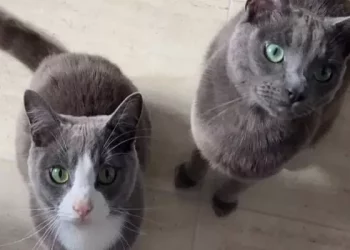Davis, CA — A new study from the University of California, Davis, School of Veterinary Medicine has found that cats would rather eat freely available food than work for their meals—a behavior that sets them apart from many other animals.
Published in the journal Animal Cognition, the research examined whether domestic cats engage in “contrafreeloading,” a phenomenon where animals prefer to perform tasks for food rather than take an easy meal. Surprisingly, most of the 17 cats in the study chose an accessible tray of food over a simple puzzle that required effort to obtain the same reward.
Cats Defy Animal Norms
While species like birds, rodents, wolves, and even giraffes typically enjoy working for their food, cats showed little interest in the challenge.
“Out of all these species, cats seem to be the only ones that showed no strong tendency to contrafreeload,” said lead author Mikel Delgado, a cat behaviorist and researcher at UC Davis. “It wasn’t that cats never used the food puzzle, but they clearly preferred the tray—eating more from it, spending more time there, and choosing it first.”
Laziness Not a Factor
The researchers ruled out inactivity as an explanation, noting that even highly energetic cats in the study opted for the effortless meal. The team, including co-authors Melissa Bain and Brandon Han, suggests that the puzzle may not have effectively mimicked natural hunting behaviors, potentially skewing results.
Why Do Cats Prefer a Free Meal?
The exact reason remains unclear, but the findings challenge assumptions about feline motivation. Unlike dogs, which often engage in problem-solving for rewards, cats may prioritize efficiency—a trait that could stem from their solitary hunting instincts.
This study adds to growing research on feline behavior, following recent findings that cats are less likely than dogs to avoid people who upset their owners.
Related topics:



























